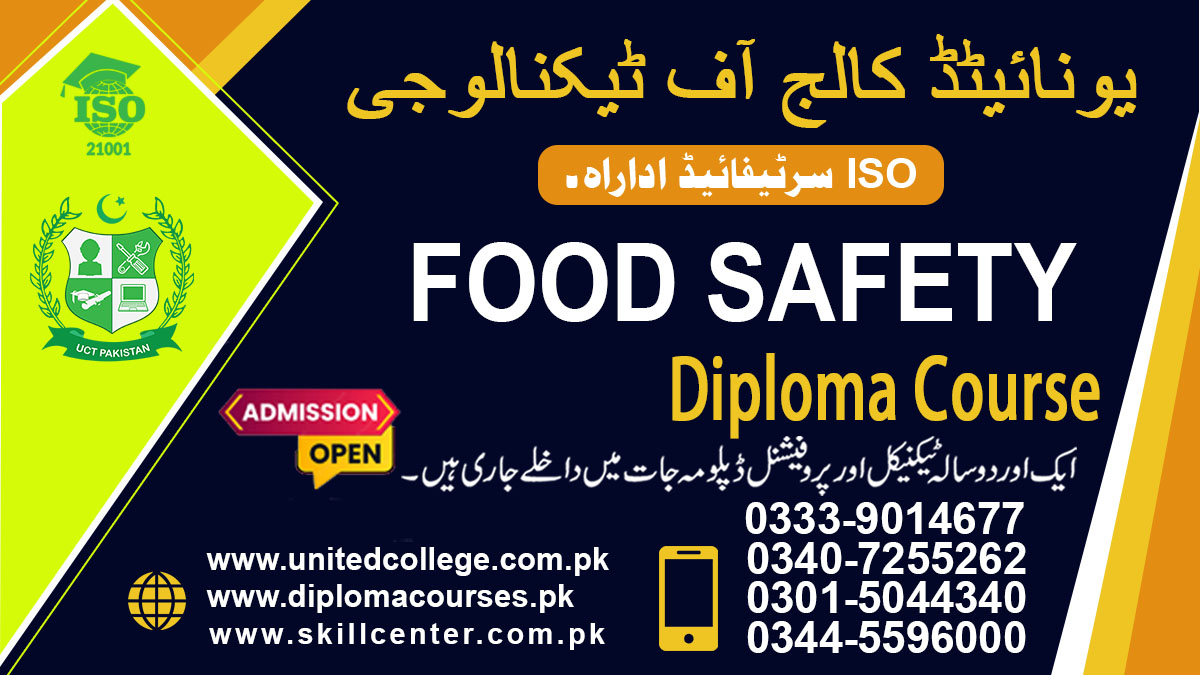Ensure Food Hygiene and Compliance with a Food Safety Course in Rawalpindi

Food safety is a critical component of the food industry. Whether you are running a restaurant, managing a catering business, or working in a food processing plant, ensuring that food is handled, prepared, and stored safely is essential for maintaining public health and protecting your business. In Rawalpindi, the demand for food safety training is growing as businesses recognize the importance of adhering to food safety standards.
Enrolling in a Food Safety Course in Rawalpindi provides individuals with the knowledge and skills required to maintain food hygiene, prevent contamination, and comply with local and international food safety regulations. In this article, we will explore the benefits of food safety training, the core elements of the course, and the career opportunities available to certified professionals in Rawalpindi.
Why Food Safety Matters
Food safety is not just about following regulations—it is about protecting public health, ensuring that the food served or sold is safe to eat. Every year, millions of people worldwide suffer from foodborne illnesses, which are often caused by improper handling, preparation, or storage of food. In Pakistan, the issue of food safety is particularly pressing due to rapid urbanization and the increasing complexity of food supply chains.
In Rawalpindi, a growing number of businesses are realizing the importance of maintaining high food safety standards. Whether you are a small street vendor or a large-scale food producer, food safety practices can make the difference between success and failure in a competitive market.
Key Reasons Why Food Safety is Crucial:
- Preventing Foodborne Illnesses: Proper food safety practices can reduce the risk of foodborne illnesses caused by bacteria, viruses, or parasites.
- Regulatory Compliance: In Pakistan, food businesses must comply with the Punjab Food Authority (PFA) guidelines to avoid penalties and closures.
- Customer Trust and Satisfaction: Consumers are more likely to trust businesses that prioritize food hygiene, leading to repeat business and positive reviews.
- Improved Food Quality: Proper handling and storage practices ensure that food remains fresh, safe, and of high quality.
- Legal Protection: Adhering to food safety standards protects businesses from legal actions arising from foodborne illnesses or contamination incidents.
What You’ll Learn in a Food Safety Course
A Food Safety Course in Rawalpindi covers a wide range of topics to help individuals and businesses maintain safe food practices. The curriculum is designed to provide both theoretical knowledge and practical skills, ensuring that participants are well-equipped to handle real-life food safety challenges.
Here are the core elements typically covered in a food safety course:
1. Introduction to Food Safety
The course begins with an overview of food safety, highlighting its importance and the role of food handlers in preventing contamination. You will learn about common foodborne pathogens, such as E. coli, Salmonella, and Listeria, and how to reduce the risk of contamination.
2. Personal Hygiene
Personal hygiene is one of the most important aspects of food safety. In this section of the course, you will learn about proper handwashing techniques, the use of protective clothing, and best practices for maintaining cleanliness in the kitchen. Personal habits, such as touching your face or hair while handling food, are also discussed.
3. Safe Food Handling Practices
Participants are taught how to safely handle food, from receiving raw materials to serving prepared dishes. This includes guidelines on temperature control, proper storage, and preventing cross-contamination between raw and cooked foods. You will also learn how to avoid common mistakes that lead to food spoilage and contamination.
4. Temperature Control and Food Storage
One of the key principles of food safety is maintaining proper temperature control throughout the food production process. The course covers how to store food at the correct temperatures, the importance of keeping hot food hot and cold food cold, and safe methods for thawing frozen foods. Proper refrigeration and storage techniques are emphasized to prevent bacterial growth and food spoilage.
5. Cleaning and Sanitizing
Maintaining a clean and sanitized kitchen environment is essential for preventing contamination. You will learn about the different types of cleaning agents and sanitizers, as well as proper cleaning techniques for equipment, utensils, and work surfaces. The course also covers the importance of pest control and waste management in food establishments.
6. Food Safety Laws and Regulations
Food businesses in Rawalpindi must comply with local regulations set by the Punjab Food Authority (PFA) as well as international standards like the Hazard Analysis and Critical Control Points (HACCP). The course will provide an overview of these regulations and explain how businesses can ensure compliance. Participants will learn about inspection procedures, food safety audits, and how to implement corrective actions when necessary.
7. Allergen Management
Food allergies are becoming more prevalent, making allergen management an important part of food safety. You will learn how to identify common allergens, prevent cross-contact, and properly label food products to inform customers about potential allergens. This section is crucial for food businesses that serve a wide range of customers, including those with dietary restrictions.
8. Dealing with Foodborne Illness Incidents
In the event of a foodborne illness outbreak, it is important to know how to respond quickly and effectively. The course will teach you how to handle such incidents, including steps for recalling contaminated food, reporting the incident to authorities, and implementing corrective measures to prevent future outbreaks.
Benefits of Taking a Food Safety Course in Rawalpindi
Completing a Food Safety Course in Rawalpindi offers numerous benefits for individuals and businesses alike. Here are some key advantages:
1. Enhanced Career Opportunities
Food safety is a growing field, and businesses are increasingly looking for qualified professionals who can ensure compliance with safety standards. By completing a food safety course, you will enhance your employability and open up opportunities for roles such as food safety officer, quality control manager, and public health inspector.
2. Improved Business Operations
For business owners, having a team trained in food safety can improve overall operations. Proper food safety practices reduce the risk of contamination, minimize food waste, and improve customer satisfaction. This, in turn, can lead to higher profits and a better reputation in the industry.
3. Compliance with Local and International Regulations
Understanding food safety laws is essential for businesses to operate legally and avoid penalties. A food safety course ensures that you are well-versed in local regulations, such as those set by the Punjab Food Authority, and international standards like HACCP. Compliance with these regulations protects your business from legal issues and enhances its credibility.
4. Customer Trust and Loyalty
Consumers today are more aware of food safety issues and are likely to choose businesses that prioritize hygiene and safety. By having a team that is trained in food safety, you can build trust with your customers, leading to repeat business and positive word-of-mouth recommendations.
5. Prevention of Foodborne Illnesses
The knowledge gained from a food safety course will enable you to prevent foodborne illnesses in your establishment. This is not only important for protecting public health but also for avoiding the legal and financial consequences that can arise from foodborne illness outbreaks.
Career Opportunities After Completing a Food Safety Course
A food safety course can open up a variety of career paths in the food industry. Some of the most common roles include:
1. Food Safety Officer
As a food safety officer, you will be responsible for ensuring that food businesses comply with safety regulations. Your duties will include conducting inspections, identifying hazards, and advising businesses on how to improve their food safety practices.
2. Quality Control Manager
Quality control managers oversee the safety and quality of food products in production facilities. They ensure that food is produced according to safety standards and that contamination is avoided at every stage of the production process.
3. Restaurant Manager
Restaurant managers play a crucial role in maintaining food safety in their establishments. With a food safety certification, you will be better equipped to train staff, enforce hygiene practices, and ensure compliance with food safety regulations.
4. Public Health Inspector
Public health inspectors work for government agencies, conducting inspections of food businesses to ensure that they are following food safety laws. They investigate complaints, perform audits, and provide recommendations for improving food safety practices.
Conclusion
A Food Safety Course in Rawalpindi is essential for anyone involved in the food industry, whether you’re just starting out or looking to advance your career. By gaining a thorough understanding of food safety principles, hygiene practices, and regulatory requirements, you’ll be well-equipped to ensure food quality and protect public health.
AtUnitedcollege.com.pk, we offer comprehensive food safety training that is tailored to the needs of individuals and businesses in Rawalpindi. Our courses are designed to provide both theoretical knowledge and practical skills, ensuring that you leave the course confident in your ability to maintain food safety standards. Enroll today to take the next step in your food safety career.
 Daily Blogger News Stay updated with the latest trends and insights. Your reliable source for daily updates and information.
Daily Blogger News Stay updated with the latest trends and insights. Your reliable source for daily updates and information.







